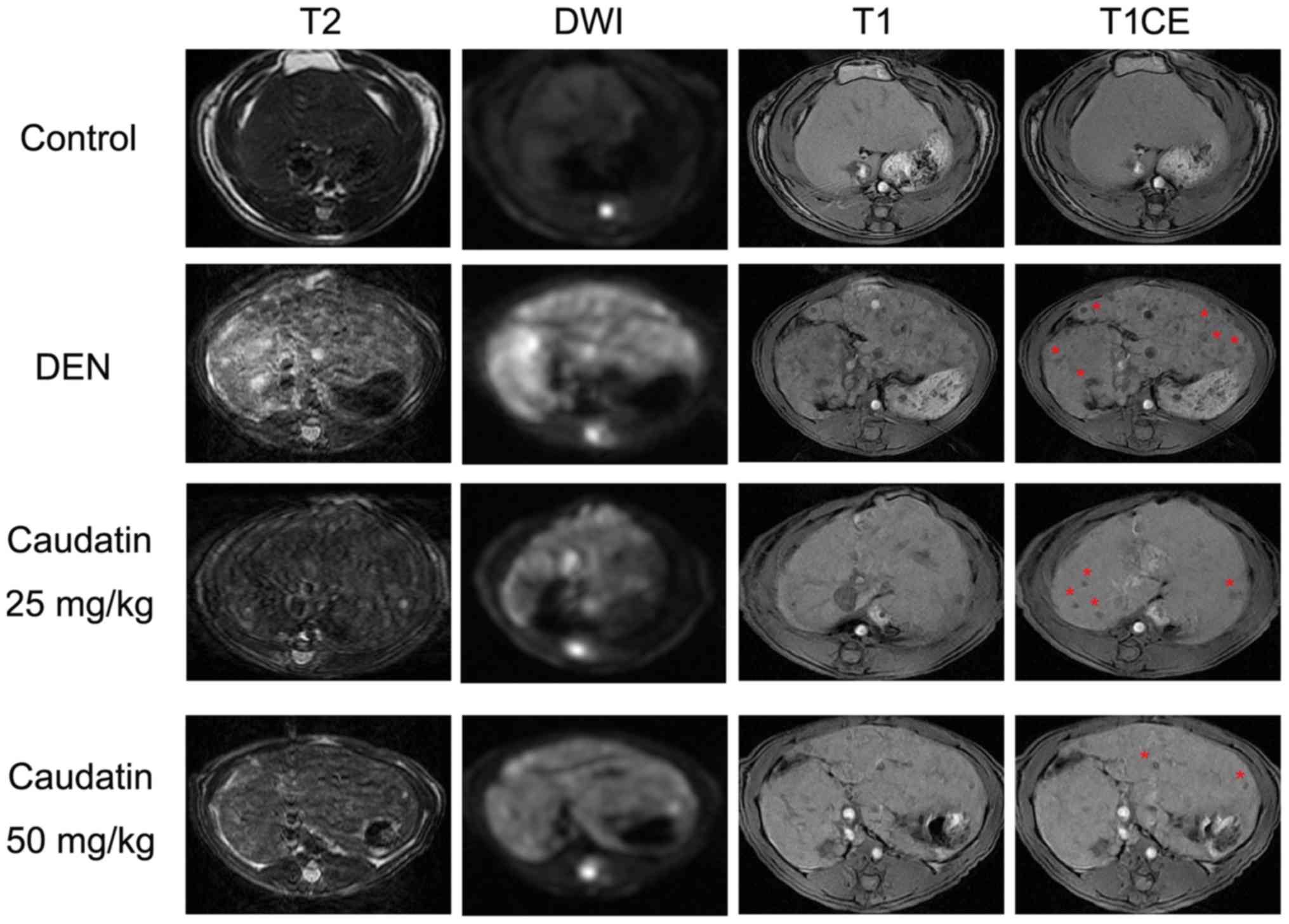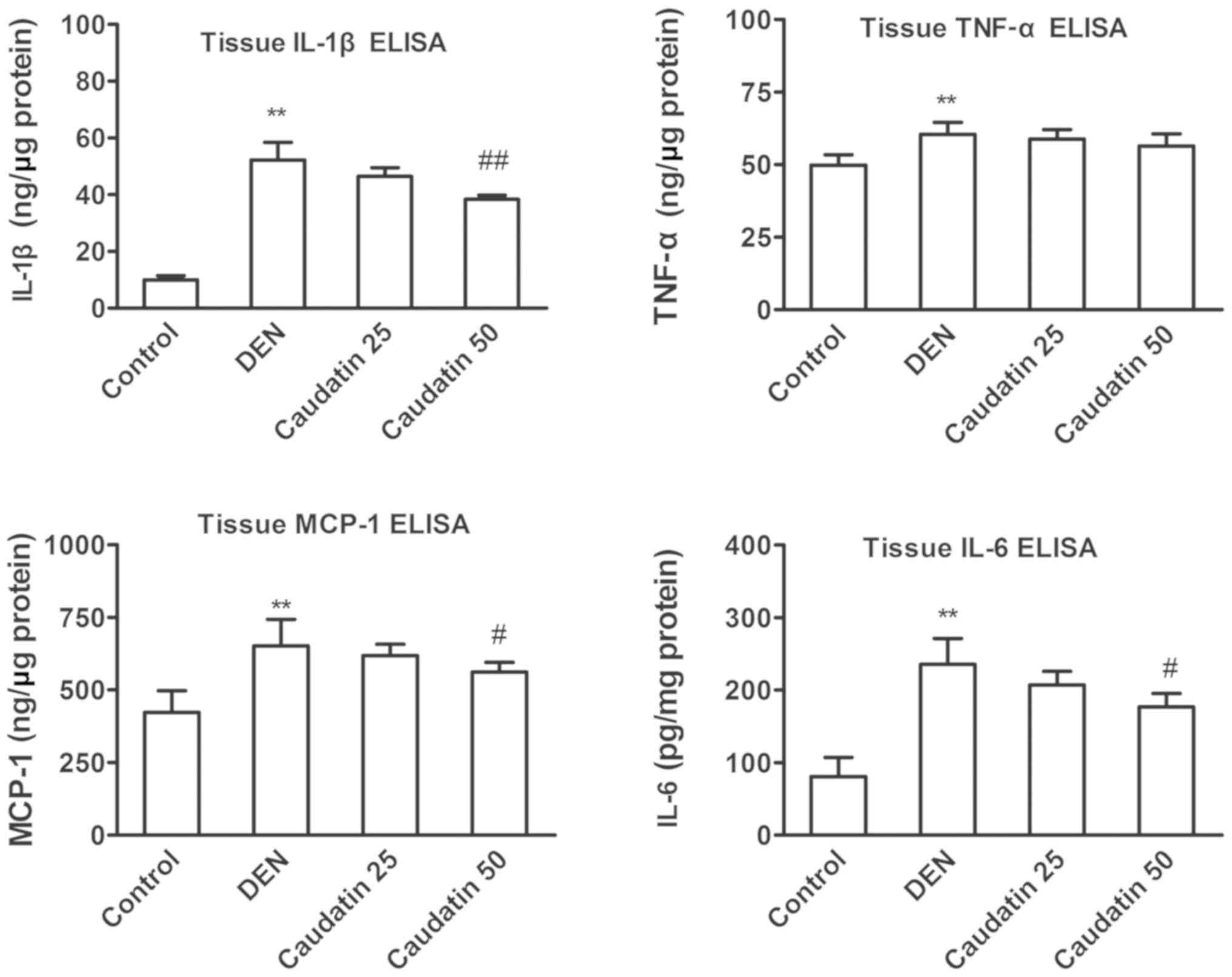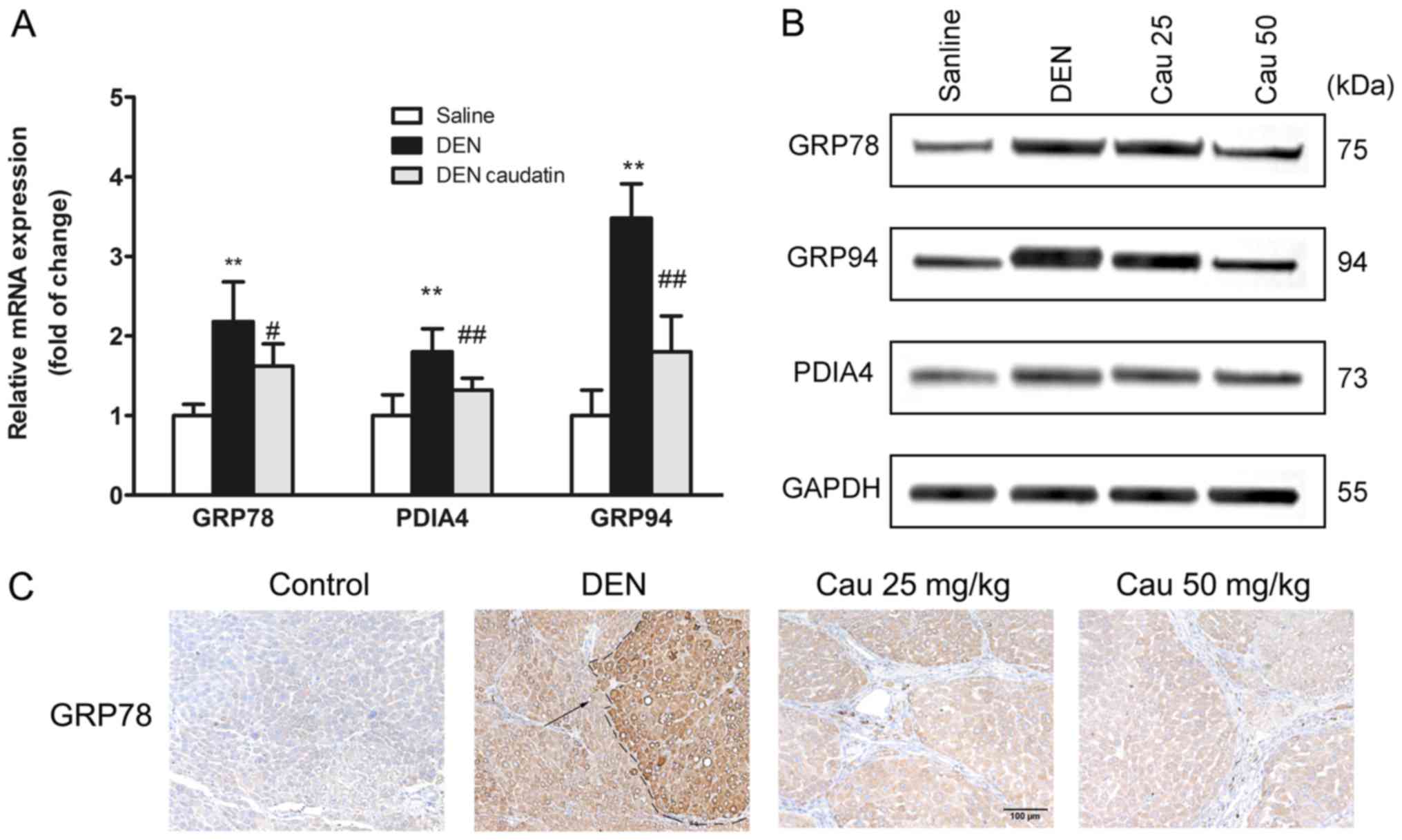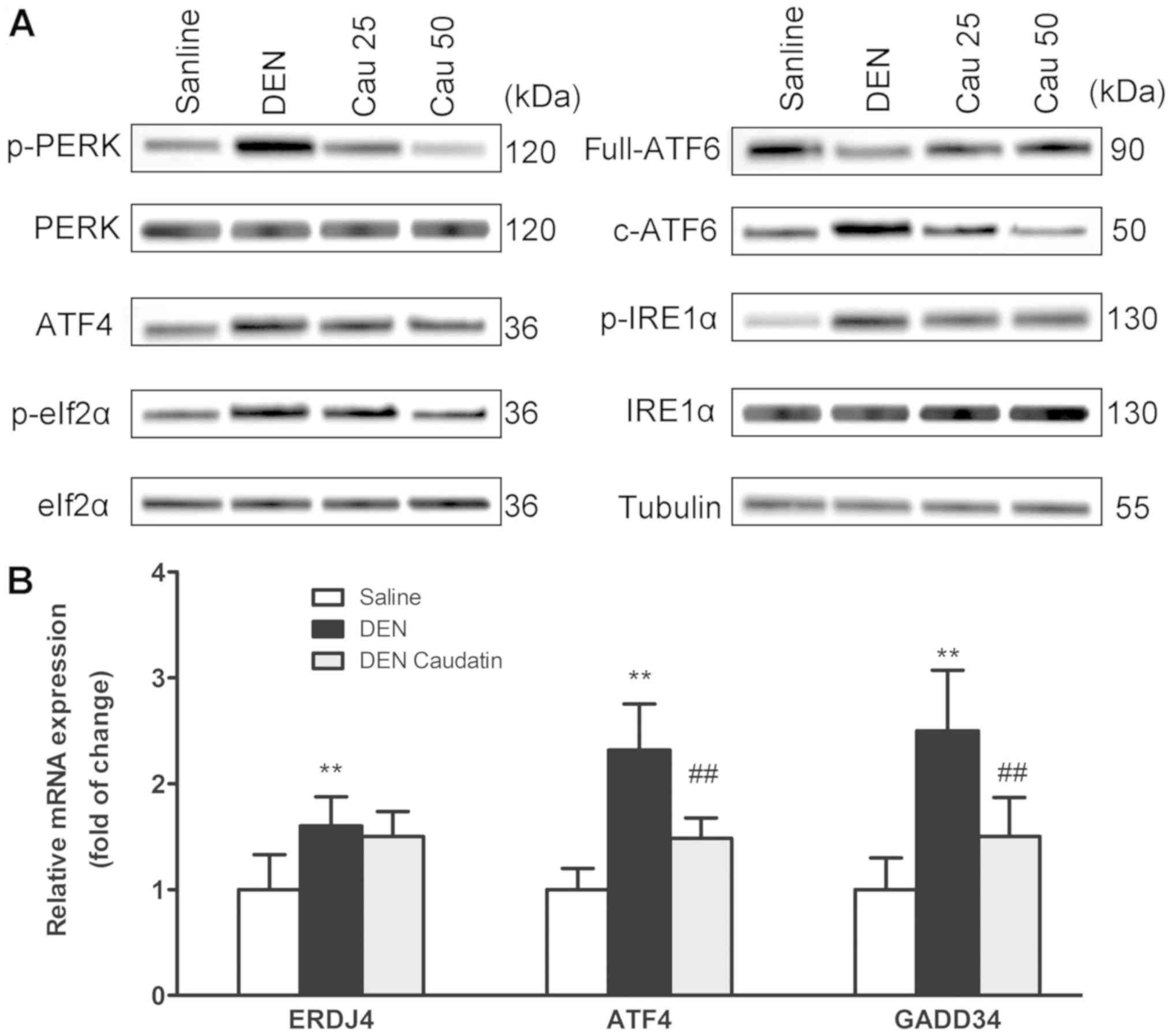|
1
|
Wang Y, Yang Z, Wang L, Sun L, Liu Z, Li
Q, Yao B, Chen T, Wang C, Yang W, et al: miR-532-3p promotes
hepatocellular carcinoma progression by targeting PTPRT. Biomed
Pharmacother. 109:991–999. 2019. View Article : Google Scholar : PubMed/NCBI
|
|
2
|
Fang D, Xiong Z, Xu J, Yin J and Luo R:
Chemopreventive mechanisms of galangin against hepatocellular
carcinoma: A review. Biomed Pharmacother. 109:2054–2061. 2019.
View Article : Google Scholar : PubMed/NCBI
|
|
3
|
Shlomai A, de Jong YP and Rice CM: Virus
associated malignancies: The role of viral hepatitis in
hepatocellular carcinoma. Semin Cancer Biol. 26:78–88. 2014.
View Article : Google Scholar : PubMed/NCBI
|
|
4
|
Liu J, Fan L, Yu H, Zhang J, He Y, Feng D,
Wang F, Li X, Liu Q, Li Y, et al: Endoplasmic reticulum stress
causes liver cancer cells to release Exosomal miR-23a-3p and
Up-regulate programmed death Ligand 1 expression in macrophages.
Hepatology. 70:241–258. 2019.PubMed/NCBI
|
|
5
|
Li G, Liu D, Cooper TK, Kimchi ET, Qi X,
Avella DM, Li N, Yang QX, Kester M, Rountree CB, et al: Successful
chemoimmunotherapy against hepatocellular cancer in a novel murine
model. J Hepatol. 66:75–85. 2017. View Article : Google Scholar : PubMed/NCBI
|
|
6
|
Wu K, Kryczek I, Chen L, Zou W and Welling
TH: Kupffer cell suppression of CD8+ T cells in human
hepatocellular carcinoma is mediated by B7-H1/programmed death-1
interactions. Cancer Res. 69:8067–8075. 2009. View Article : Google Scholar : PubMed/NCBI
|
|
7
|
Park EJ, Lee JH, Yu GY, He G, Ali SR,
Holzer RG, Osterreicher CH, Takahashi H and Karin M: Dietary and
genetic obesity promote liver inflammation and tumorigenesis by
enhancing IL-6 and TNF expression. Cell. 140:197–208. 2010.
View Article : Google Scholar : PubMed/NCBI
|
|
8
|
Clarke HJ, Chambers JE, Liniker E and
Marciniak SJ: Endoplasmic reticulum stress in malignancy. Cancer
Cell. 25:563–573. 2014. View Article : Google Scholar : PubMed/NCBI
|
|
9
|
Peñaranda Fajardo NM, Meijer C and Kruyt
FA: The endoplasmic reticulum stress/unfolded protein response in
gliomagenesis, tumor progression and as a therapeutic target in
glioblastoma. Biochem Pharmacol. 118:1–8. 2016. View Article : Google Scholar : PubMed/NCBI
|
|
10
|
Fan L, Sun G, Ma T, Zhong F, Lei Y, Li X
and Wei W: Melatonin reverses tunicamycin-induced endoplasmic
reticulum stress in human hepatocellular carcinoma cells and
improves cytotoxic response to doxorubicin by increasing CHOP and
decreasing survivin. J Pineal Res. 55:184–194. 2013. View Article : Google Scholar : PubMed/NCBI
|
|
11
|
Zha L, Fan L, Sun G, Wang H, Ma T, Zhong F
and Wei W: Melatonin sensitizes human hepatoma cells to endoplasmic
reticulum stress-induced apoptosis. J Pineal Res. 52:322–331. 2012.
View Article : Google Scholar : PubMed/NCBI
|
|
12
|
Chen Y, Tsai YH and Tseng SH: HDAC
Inhibitors and RECK modulate endoplasmic reticulum stress in tumor
cells. Int J Mol Sci. 18(pii): E2582017. View Article : Google Scholar : PubMed/NCBI
|
|
13
|
Vandewynckel YP, Laukens D, Bogaerts E,
Paridaens A, Van den Bussche A, Verhelst X, Van Steenkiste C,
Descamps B, Vanhove C, Libbrecht L, et al: Modulation of the
unfolded protein response impedes tumor cell adaptation to
proteotoxic stress: A PERK for hepatocellular carcinoma therapy.
Hepatol Int. 9:93–104. 2014. View Article : Google Scholar : PubMed/NCBI
|
|
14
|
Li J and Lee AS: Stress induction of
GRP78/BiP and its role in cancer. Curr Mol Med. 6:45–54. 2006.
View Article : Google Scholar : PubMed/NCBI
|
|
15
|
Lebeau P, Byun JH, Yousof T and Austin RC:
Pharmacologic inhibition of S1P attenuates ATF6 expression, causes
ER stress and contributes to apoptotic cell death. Toxicol Appl
Pharmacol. 349:1–7. 2018. View Article : Google Scholar : PubMed/NCBI
|
|
16
|
Spaan CN, Smit WL, van Lidth de Jeude JF,
Meijer BJ, Muncan V, van den Brink GR and Heijmans J: Expression of
UPR effector proteins ATF6 and XBP1 reduce colorectal cancer cell
proliferation and stemness by activating PERK signaling. Cell Death
Dis. 10:4902019. View Article : Google Scholar : PubMed/NCBI
|
|
17
|
Scaiewicz V, Nahmias A, Chung RT, Mueller
T, Tirosh B and Shibolet O: CCAAT/enhancer-binding protein
homologous (CHOP) protein promotes carcinogenesis in the
DEN-induced hepatocellular carcinoma model. PLoS One. 8:e810652013.
View Article : Google Scholar : PubMed/NCBI
|
|
18
|
Hetz C: The unfolded protein response:
Controlling cell fate decisions under ER stress and beyond. Nat Rev
Mol Cell Biol. 13:89–102. 2012. View Article : Google Scholar : PubMed/NCBI
|
|
19
|
Shuda M, Kondoh N, Imazeki N, Tanaka K,
Okada T, Mori K, Hada A, Arai M, Wakatsuki T, Matsubara O, et al:
Activation of the ATF6, XBP1 and grp78 genes in human
hepatocellular carcinoma: A possible involvement of the ER stress
pathway in hepatocarcinogenesis. J Hepatol. 38:605–614. 2003.
View Article : Google Scholar : PubMed/NCBI
|
|
20
|
Wang X, Fu X, Zhao S, Fu X, Zhang H, Shao
L, Li G and Fan C: Antiangiogenic properties of caudatin in
vitro and in vivo by suppression of VEGF-VEGFR2-AKT/FAK
signal axis. Mol Med Rep. 16:8937–8943. 2017. View Article : Google Scholar : PubMed/NCBI
|
|
21
|
Tan ZW, Xie S, Hu SY, Liao T, Liu P, Peng
KH, Yang XZ, He ZL, Tang HY, Cui Y, et al: Caudatin targets
TNFAIP1/NF-κB and cytochrome c/caspase signaling to suppress tumor
progression in human uterine cancer. Int J Oncol. 49:1638–1650.
2016. View Article : Google Scholar : PubMed/NCBI
|
|
22
|
Peng Y and Ding Y: Pharmacokinetics and
tissue distribution study of caudatin in normal and
diethylnitrosamine-induced hepatocellular carcinoma model rats.
Molecules. 20:4225–4237. 2015. View Article : Google Scholar : PubMed/NCBI
|
|
23
|
Fu XY, Zhang S, Wang K, Yang MF, Fan CD
and Sun BL: Caudatin inhibits human Glioma cells growth through
triggering DNA damage-mediated cell cycle arrest. Cell Mol
Neurobiol. 35:953–959. 2015. View Article : Google Scholar : PubMed/NCBI
|
|
24
|
Li X, Zhang X, Liu X, Tan Z, Yang C, Ding
X, Hu X, Zhou J, Xiang S, Zhou C and Zhang J: Caudatin induces cell
apoptosis in gastric cancer cells through modulation of
Wnt/beta-catenin signaling. Oncol Rep. 30:677–684. 2013. View Article : Google Scholar : PubMed/NCBI
|
|
25
|
Luo Y, Sun Z, Li Y, Liu L, Cai X and Li Z:
Caudatin inhibits human hepatoma cell growth and metastasis through
modulation of the Wnt/β-catenin pathway. Oncol Rep. 30:2923–2928.
2013. View Article : Google Scholar : PubMed/NCBI
|
|
26
|
Livak KJ and Schmittgen TD: Analysis of
relative gene expression data using real-time quantitative PCR and
the 2(-Delta Delta C(T)) method. Methods. 25:402–408. 2001.
View Article : Google Scholar : PubMed/NCBI
|
|
27
|
Bakiri L, Hamacher R, Graña O,
Guío-Carrión A, Campos-Olivas R, Martinez L, Dienes HP, Thomsen MK,
Hasenfuss SC and Wagner EF: Liver carcinogenesis by FOS-dependent
inflammation and cholesterol dysregulation. J Exp Med.
214:1387–1409. 2017. View Article : Google Scholar : PubMed/NCBI
|
|
28
|
Liang S, Ma HY, Zhong Z, Dhar D, Liu X, Xu
J, Koyama Y, Nishio T, Karin D, Karin G, et al: NADPH oxidase 1 in
liver macrophages promotes inflammation and tumor development in
mice. Gastroenterology. 156:1156–1172.e6. 2019. View Article : Google Scholar : PubMed/NCBI
|
|
29
|
Mahmoud AM, Mohammed HM, Khadrawy SM and
Galaly SR: Hesperidin protects against chemically induced
hepatocarcinogenesis via modulation of Nrf2/ARE/HO-1, PPARγ and
TGF-β1/Smad3 signaling, and amelioration of oxidative stress and
inflammation. Chem Biol Interact. 277:146–158. 2017. View Article : Google Scholar : PubMed/NCBI
|
|
30
|
Lu JW, Liao CY, Yang WY, Lin YM, Jin SL,
Wang HD and Yuh CH: Overexpression of endothelin 1 triggers
hepatocarcinogenesis in zebrafish and promotes cell proliferation
and migration through the AKT pathway. PLoS One. 9:e853182014.
View Article : Google Scholar : PubMed/NCBI
|
|
31
|
Kobylewski SE, Henderson KA, Yamada KE and
Eckhert CD: Activation of the EIF2α/ATF4 and ATF6 Pathways in
DU-145 Cells by boric acid at the concentration reported in men at
the US mean boron intake. Biol Trace Elem Res. 176:278–293. 2017.
View Article : Google Scholar : PubMed/NCBI
|
|
32
|
Shoulders MD, Ryno LM, Genereux JC,
Moresco JJ, Tu PG, Wu C, Yates JR III, Su AI, Kelly JW and Wiseman
RL: Stress-independent activation of XBP1s and/or ATF6 reveals
three functionally diverse ER proteostasis environments. Cell Rep.
3:1279–1292. 2013. View Article : Google Scholar : PubMed/NCBI
|
|
33
|
Lee AH, Iwakoshi NN and Glimcher LH: XBP-1
regulates a subset of endoplasmic reticulum resident chaperone
genes in the unfolded protein response. Mol Cell Biol.
23:7448–7459. 2003. View Article : Google Scholar : PubMed/NCBI
|
|
34
|
Tolba R, Kraus T, Liedtke C, Schwarz M and
Weiskirchen R: Diethylnitrosamine (DEN)-induced carcinogenic liver
injury in mice. Lab Anim. 49 (Suppl 1):S59–S69. 2015. View Article : Google Scholar
|
|
35
|
Lin H, Liu XB, Yu JJ, Hua F and Hu ZW:
Antioxidant N-acetylcysteine attenuates hepatocarcinogenesis by
inhibiting ROS/ER stress in TLR2 deficient mouse. PLoS One.
8:e741302013. View Article : Google Scholar : PubMed/NCBI
|
|
36
|
Liu H, Zhang X, Zhang S, Huang H, Wu J,
Wang Y, Yuan L, Liu C, Zeng X, Cheng X, et al: Oxidative stress
mediates Microcystin-LR-induced endoplasmic reticulum stress and
autophagy in KK-1 cells and C57BL/6 mice ovaries. Front Physiol.
9:10582018. View Article : Google Scholar : PubMed/NCBI
|
|
37
|
Liu M, Du L, He Z, Yan L, Shi Y, Shang J
and Tang H: Increased ERp57 Expression in HBV-related
hepatocellular carcinoma: Possible correlation and prognosis.
Biomed Res Int. 2017:12526472017.PubMed/NCBI
|
|
38
|
Zhou X, Han D, Yang X, Wang X and Qiao A:
Glucose regulated protein 78 is potentially an important player in
the development of nonalcoholic steatohepatitis. Gene. 637:138–144.
2017. View Article : Google Scholar : PubMed/NCBI
|
|
39
|
Nermin AHS, EL-Maraghy SA and Manal FI:
Diethylnitrosamine- induced hepatocarcinogenesis in rats: Possible
chemoprevention by blueberries. African J Bioch Res. 2:81–87.
2008.
|
|
40
|
Wang P, Ji R, Ji J and Chen F: Changes of
metabolites of acrylamide and glycidamide in acrylamide-exposed
rats pretreated with blueberry anthocyanins extract. Food Chem.
274:611–619. 2019. View Article : Google Scholar : PubMed/NCBI
|
|
41
|
Ghosh S, Nandi S, Ghosh C and
Bhattacharyya K: Fluorescence dynamics in the endoplasmic reticulum
of a live cell: Time-resolved confocal microscopy. Chemphyschem.
17:2818–2823. 2016. View Article : Google Scholar : PubMed/NCBI
|
|
42
|
Huang RZ, Huang XC, Zhang B, Jia HY, Liao
ZX and Wang HS: 16-O-caffeoyl-16-hydroxylhexadecanoic acid, a
medicinal plant-derived phenylpropanoid, induces apoptosis in human
hepatocarcinoma cells through ROS-dependent endoplasmic reticulum
stress. Phytomedicine. 41:33–44. 2018. View Article : Google Scholar : PubMed/NCBI
|
|
43
|
Wang M and Kaufman RJ: The impact of the
endoplasmic reticulum protein-folding environment on cancer
development. Nat Rev Cancer. 14:581–597. 2014. View Article : Google Scholar : PubMed/NCBI
|
|
44
|
Wakai T, Zhang N, Vangheluwe P and Fissore
RA: Regulation of endoplasmic reticulum Ca(2+) oscillations in
mammalian eggs. J Cell Sci. 126:5714–5724. 2013. View Article : Google Scholar : PubMed/NCBI
|
|
45
|
Cubillos-Ruiz JR, Bettigole SE and
Glimcher LH: Tumorigenic and immunosuppressive effects of
endoplasmic reticulum stress in cancer. Cell. 168:692–706. 2017.
View Article : Google Scholar : PubMed/NCBI
|
|
46
|
Tang H, Bao X, Shen Y, Song M, Wang S,
Wang C and Hou J: Engineering protein folding and translocation
improves heterologous protein secretion in Saccharomyces
cerevisiae. Biotechnol Bioeng. 112:1872–1882. 2015. View Article : Google Scholar : PubMed/NCBI
|
|
47
|
Li X, Zhang K and Li Z: Unfolded protein
response in cancer: The physician's perspective. J Hematol Oncol.
4:82011. View Article : Google Scholar : PubMed/NCBI
|
|
48
|
Jiang CC, Yang F, Thorne RF, Zhu BK,
Hersey P and Zhang XD: Human melanoma cells under endoplasmic
reticulum stress acquire resistance to microtubule-targeting drugs
through XBP-1-mediated activation of Akt. Neoplasia. 11:436–447.
2009. View Article : Google Scholar : PubMed/NCBI
|
|
49
|
Pfaffenbach KT and Lee AS: The critical
role of GRP78 in physiologic and pathologic stress. Curr Opin Cell
Biol. 23:150–156. 2011. View Article : Google Scholar : PubMed/NCBI
|
|
50
|
Kao RH, Lai GM, Chow JM, Liao CH, Zheng
YM, Tsai WL, Hsia S, Lai IC, Lee HL, Chuang SE, et al: Opposite
regulation of CHOP and GRP78 and synergistic apoptosis induction by
selenium Yeast and Fish Oil via AMPK activation in lung
adenocarcinoma cells. Nutrients. 10(pii): E14582018. View Article : Google Scholar : PubMed/NCBI
|
|
51
|
Liu R, Li X, Gao W, Zhou Y, Wey S, Mitra
SK, Krasnoperov V, Dong D, Liu S, Li D, et al: Monoclonal antibody
against cell surface GRP78 as a novel agent in suppressing PI3K/AKT
signaling, tumor growth, and metastasis. Clin Cancer Res.
19:6802–6811. 2013. View Article : Google Scholar : PubMed/NCBI
|
|
52
|
Hensel F, Eckstein M, Rosenwald A and
Brandlein S: Early development of PAT-SM6 for the treatment of
melanoma. Melanoma Res. 23:264–275. 2013.PubMed/NCBI
|
|
53
|
Kanemoto S, Nitani R, Murakami T, Kaneko
M, Asada R, Matsuhisa K, Saito A and Imaizumi K: Multivesicular
body formation enhancement and exosome release during endoplasmic
reticulum stress. Biochem Biophys Res Commun. 480:166–172. 2016.
View Article : Google Scholar : PubMed/NCBI
|
|
54
|
Zuo L, Zhu Y, Hu L, Liu Y, Wang Y, Hu Y,
Wang H, Pan X, Li K, Du N and Huang Y: PI3-kinase/Akt
pathway-regulated membrane transportation of acid-sensing ion
channel 1a/Calcium ion influx/endoplasmic reticulum stress
activation on PDGF-induced HSC Activation. J Cell Mol Med.
23:3940–3950. 2019. View Article : Google Scholar : PubMed/NCBI
|
|
55
|
Schonthal AH: Pharmacological targeting of
endoplasmic reticulum stress signaling in cancer. Biochem
Pharmacol. 85:653–666. 2013. View Article : Google Scholar : PubMed/NCBI
|
|
56
|
Hamanaka RB, Bennett BS, Cullinan SB and
Diehl JA: PERK and GCN2 contribute to eIF2alpha phosphorylation and
cell cycle arrest after activation of the unfolded protein response
pathway. Mol Biol Cell. 16:5493–5501. 2005. View Article : Google Scholar : PubMed/NCBI
|
|
57
|
Sanchez-Alvarez M, Del Pozo MA and Bakal
C: Publisher correction: AKT-mTOR signaling modulates the dynamics
of IRE1 RNAse activity by regulating ER-mitochondria contacts. Sci
Rep. 8:64762018. View Article : Google Scholar : PubMed/NCBI
|
|
58
|
Zhang Z, Chen J, Chen F, Yu D, Li R, Lv C,
Wang H, Li H, Li J and Cai Y: Tauroursodeoxycholic acid alleviates
secondary injury in the spinal cord via up-regulation of CIBZ gene.
Cell Stress Chaperones. 23:551–560. 2018. View Article : Google Scholar : PubMed/NCBI
|
|
59
|
Bettigole SE and Glimcher LH: Endoplasmic
reticulum stress in immunity. Ann Rev Immunol. 33:107–138. 2015.
View Article : Google Scholar
|
|
60
|
Verfaillie T, Garg AD and Agostinis P:
Targeting ER stress induced apoptosis and inflammation in cancer.
Cancer Lett. 332:249–264. 2013. View Article : Google Scholar : PubMed/NCBI
|
|
61
|
Zhang K and Kaufman RJ: From
endoplasmic-reticulum stress to the inflammatory response. Nature.
454:455–462. 2008. View Article : Google Scholar : PubMed/NCBI
|
|
62
|
Taniguchi K and Karin M: IL-6 and related
cytokines as the critical lynchpins between inflammation and
cancer. Semin Immunol. 26:54–74. 2014. View Article : Google Scholar : PubMed/NCBI
|
|
63
|
Nakagawa H, Umemura A, Taniguchi K,
Font-Burgada J, Dhar D, Ogata H, Zhong Z, Valasek MA, Seki E,
Hidalgo J, et al: ER stress cooperates with hypernutrition to
trigger TNF-dependent spontaneous HCC development. Cancer Cell.
26:331–343. 2014. View Article : Google Scholar : PubMed/NCBI
|
|
64
|
Xiang DM, Sun W, Ning BF, Zhou TF, Li XF,
Zhong W, Cheng Z, Xia MY, Wang X, Deng X, et al: The HLF/IL-6/STAT3
feedforward circuit drives hepatic stellate cell activation to
promote liver fibrosis. Gut. 67:1704–1715. 2018. View Article : Google Scholar : PubMed/NCBI
|
|
65
|
Gosain R, Anwar S, Miller A, Iyer R and
Mukherjee S: Interleukin-6 as a biomarker in patients with
hepatobiliary cancers. J Gastrointest Oncol. 10:537–545. 2019.
View Article : Google Scholar : PubMed/NCBI
|
|
66
|
Cuylen S, Blaukopf C, Politi AZ,
Müller-Reichert T, Neumann B, Poser I, Ellenberg J, Hyman AA and
Gerlich DW: Ki-67 acts as a biological surfactant to disperse
mitotic chromosomes. Nature. 535:308–312. 2016. View Article : Google Scholar : PubMed/NCBI
|
|
67
|
Basturk O, Yang Z, Tang LH, Hruban RH,
Adsay V, McCall CM, Krasinskas AM, Jang KT, Frankel WL, Balci S, et
al: The high-grade (WHO G3) pancreatic neuroendocrine tumor
category is morphologically and biologically heterogenous and
includes both well differentiated and poorly differentiated
neoplasms. Am J Surg Pathol. 39:683–690. 2015. View Article : Google Scholar : PubMed/NCBI
|
|
68
|
Inwald EC, Klinkhammer-Schalke M,
Hofstadter F, Zeman F, Koller M, Gerstenhauer M and Ortmann O:
Ki-67 is a prognostic parameter in breast cancer patients: Results
of a large population-based cohort of a cancer registry. Breast
Cancer Res Treat. 139:539–552. 2013. View Article : Google Scholar : PubMed/NCBI
|



















